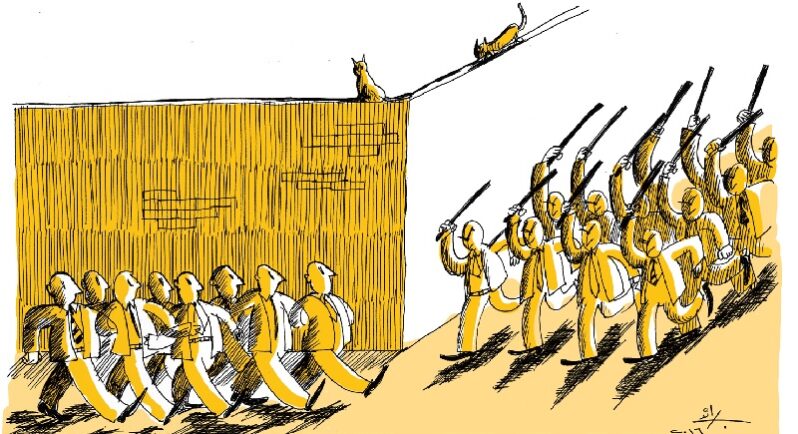Ending Egypt’s Perpetual State of Emergency: What Next?

On 25 October 2021, in the first step of its kind, Egyptian President Abdel Fattah el-Sisi announced via Facebook that he would not extend the state of emergency effective throughout the country from April 2017. He justified the decision on the basis that Egypt has become an “oasis of security and stability in the region”. Although the decision followed the launch of the government’s first national human rights strategy in September 2021, it was still a surprise by any measure as the strategy did not mention canceling the state of emergency as a government goal. Rather, it focused on issues concerning the application of some of the Emergency Law’s provisions and how to address them.
The cancellation of the long-standing state of emergency warrants an analysis of its direct legal effects. The most important include the implications for the exceptional State Security Emergency Courts. Their operation may be the practical effect of the state of emergency most heavily felt during the past few years. We must also study the effects of the near-permanent application of a state of emergency over the past decades on the legislative system and legal practice in Egypt.
What Does Cancelling the State of Emergency Mean in Practice?
Legally, a state of emergency is an exceptional system that requires effectuating a number of exceptional legal provisions and norms that grant the executive authority powers not provided by the regular legal system for the purpose of confronting extraordinary circumstances that could harm security, public order, or public health. Emergency Law no. 162 of 1958 is the framework governing these “exceptional provisions” required by the state of emergency and their scope and means of application. The first, direct practical effect of the president’s decision is to render the law legally “frozen” and immediately suspend its provisions. In other words, from now on, the executive authority may not take any decisions or measures based on the powers that the Emergency Law grants it, foremost among them the power to refer defendants in various crimes to the State Security Emergency Courts formed under this law.[1]
The State Security Emergency Courts, commonly known as the “emergency judiciary”, constitute an exceptional judicial system that operates alongside the regular justice system and is competent to examine various ordinary law crimes determined by the executive branch.[2] Its legitimacy depends on the existence of a state of emergency: it becomes operational as soon as a state of emergency is declared and the associated provisions effectuated, and in turn, its operation should cease – such that the regular judiciary recovers its functions and jurisdictions – as soon as the state of emergency is canceled. This raises the question, what happens to the cases currently before the State Security Emergency Courts, as well as those that are still at the investigation stage and whose trial procedures have not yet begun?
Article 19 of the Emergency Law answers this question. It stipulates that the State Security Emergency Courts shall continue examining the cases before them, as well as those that were referred to them before the state of emergency ended, with no change in procedures. Foremost among these procedures are the finality of these exceptional courts’ rulings and the inability to appeal them at any higher level of litigation, as well as the president’s power to either approve these rulings or instigate a retrial.[3] Article 19 also clarifies the fate of the cases that are still under investigation and have not yet been referred to these courts: they must be referred to the competent regular courts in accordance with the Code of Criminal Procedure.[4]
Hence, via this article, the legislator seems to have wanted the “exception” to continue being applied even after the state of emergency ends in order to preserve the legal positions established while it was in effect. Several lawyers working in the State Security Emergency Courts have disputed the constitutionality of this situation. On 27 October 2021, i.e. just two days after the state of emergency was canceled, lawyer Khaled Ali pleaded that Article 19 is unconstitutional during a case that had been referred to the court a few weeks earlier. According to the motion, the article violates the Constitution because it breaches guarantees of a fair and just trial, denies defendants the right to litigate on two levels, renders the judge’s ruling contingent on approval by the president or someone he or she delegates, and allows the military governor or someone they delegate to annul the ruling, reduce or commute the sentence, or order a retrial, all of which are exceptional powers that may not continue once the state of emergency has ended. We agree with this perspective. Once the imminent danger justifying the state of emergency and the exceptional measures it entails disappear, there is no justification for denying defendants in several crimes their most basic fundamental rights. Additionally, the principle of the “stability of legal positions” cannot be used to defend this text as the essence and ultimate objective of this principle is to achieve equality among individuals. It is a means of “establishing equal legal protection”, as Supreme Constitutional Court rulings have described it.[5] This objective cannot be achieved by derogating from or disabling an individual right as important and fundamental as the right to a fair and just trial. On the contrary, the most basic requirement for achieving equal legal protection is to lift the “exception” once its cause has disappeared and universalize the regular procedural norms that provide full fair trial guarantees.
How Has the Perpetual State of Emergency Influenced Egypt’s Legislative Framework?
A key task now facing everyone engaged or interested in law in Egypt is to study the effects of the perpetual state of emergency on the legislative framework and legal practice in general. Undoubtedly, the decades-long state of emergency,[6] which was long based primarily on security and political concerns,[7] influenced the Egyptian legislator’s perspective on providing the necessary procedural guarantees to defendants in crimes that may have a political character. That perspective allowed certain provisions that could be described as exceptional to infiltrate ordinary, permanent laws. Hence, once the end of the state of emergency was announced, and even though the decision is a positive step, several rights organizations rushed to demand the suspension of several other laws that they deem an extension of exceptional provisions imposed by the Emergency Law.[8] For example, Article 40 of Anti-Terrorism Law no. 94 of 2015 allows law enforcement to “keep custody” of defendants in terrorism crimes for as long as 28 days after presenting them, along with a report, to the Public Prosecution. Many liken this article to the Emergency Law text that granted the president the power to arrest and detain without complying with the Code of Criminal Procedure until the Supreme Constitutional Court ruled it unconstitutional in 2013.[9] Article 53 of the same law allows the president to take measures to preserve security and public order, including vacating, sequestering, or imposing curfews in certain areas, should any danger of terrorism crimes arise. These powers closely resemble those granted to the president by the Emergency Law.
Similarly, Decree-Law no. 136 of 2014 on Securing and Protecting Public and Vital Facilities subjects all crimes that violate its provisions to the military courts’ jurisdiction.[10] Like the State Security Emergency Courts, these exceptional courts lack the most basic fair trial guarantees. Concerningly, this law, issued in 2014 as an exceptional law effective for only two years, was extended for five more years in 2016.[11] The extension was supposed to end on 28 October 2021. However, in a surprise step that occurred as soon as the state of emergency was canceled, Parliament tentatively approved a government bill to permanently extend the law. The adoption of this amendment at this specific time raises questions about its justifications and about the future of court-martialing civilians, especially in the absence of a clear definition of “public and vital facilities”.
Now that the state of emergency has been cancelled, all Egyptian courts at all levels must focus on engaging with the applications of the aforementioned texts, among others, and referring them to the Supreme Constitutional Court so that the constitutionality of their provisions and procedures can be examined. This is an essential step toward erasing the distortions left in the Egyptian legislative framework by the security-emergency mindset that accompanied Egyptian legislators for many years.
Conclusion
Undoubtedly, the president’s decision to cease extending the state of emergency is a step forward along the path of reforming Egypt’s justice system. This step should be followed by other decisions instigating a comprehensive review of the aforementioned permanent laws containing provisions that bear an exceptional character.
This decision should also significantly enrich legal practice in Egypt. The finality of the State Security Emergency Courts’ rulings and the inability of higher courts, such as the Courts of Appeal and Court of Cassation, to examine them caused stagnation in the legal principles that the latter issue on crimes that fell under the former’s jurisdiction. Such crimes include those stipulated in the laws on assembly, protest, and terrorism, among other ordinary law crimes.[12] Now that all levels of litigation are available to defendants in these crimes, the Court of Cassation can enrich legal content more effectively on the application level.
This article is an edited translation from Arabic.
Keywords: Egypt, State of emergency, Emergency Law, State Security Emergency Courts, Legal practice, Legislative framework
[1] “al-Istratijiyya al-Wataniyya li-Huquq al-Insan: Madha Ba’da Ilgha’ Halat al-Tawari’ fi Misr?”, The Legal Agenda, 26 October 2021.
[2] See ibid. for more details about these crimes.
[3] Articles 12, 13, 14, and 15 of Emergency Law no. 162 of 1958.
[4] Article 19 of the Emergency Law stipulates,
“When the state of emergency ends, the State Security Courts shall remain competent to examine the cases that have been referred to them and continue their examination in accordance with their procedures. As for crimes whose defendants have not been presented to the courts, they shall be referred to the competent regular courts and those courts’ procedures shall be followed.”
[5] Supreme Constitutional Court ruling in Case no. 21 of constitutional year 7, issued 29 April 1989.
[6] The state of emergency was imposed after the assassination of President Anwar Sadat in October 1981, and it remained in effect throughout President Hosni Mubarak’s rule. After the 25 January 2011 revolution, it continued until the Supreme Council of the Armed Forces suspended it in May 2012. In August 2013, interim President Adly Mansour imposed a state of emergency once again, and it was extended multiple times after el-Sisi took office.
[7] The exception was the health-related state of emergency imposed by the COVID-19 measures.
[8] “Egypt: Arsenal of Repressive Laws Ensure Continuation of Permanent State of Emergency”, Cairo Institute for Human Rights Studies, 26 October 2021.
[9] Supreme Constitutional Court ruling on case no. 17 of constitutional year 15, issued 2 June 2013. The ruling found Clause 1 of Article 3 of Presidential Decree-Law no. 162 of 1958 to be unconstitutional.
[10] Article 2 of Decree-Law no. 136 of 2014 on Securing and Protecting Public and Vital Facilities.
[11] Law no. 65 of 2016 on Extending Law no. 136 of 2014 on Securing and Protecting Public and Vital Facilities.
[12] For the specific crimes, see “al-Istratijiyya al-Wataniyya”, The Legal Agenda, op. cit.



